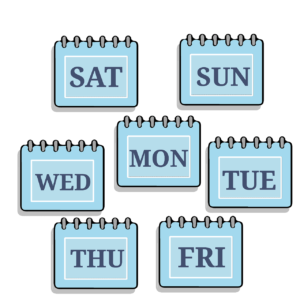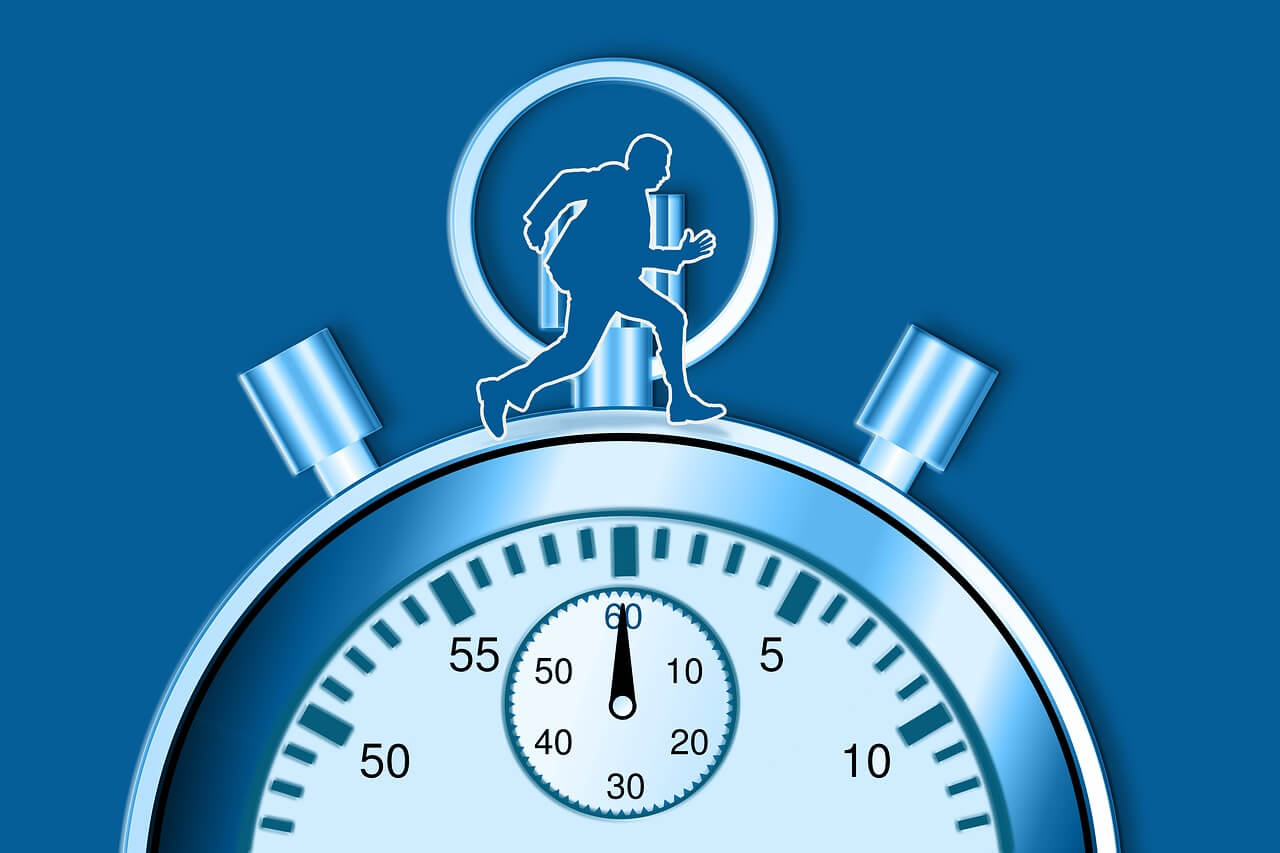10 Basic Principles of Efficient Time Management
 Time management is a relevant topic for everyone.
Time management is a relevant topic for everyone.
Nowadays, we have a lot of things to do and we need to be able to manage it all in a limited time.
That is why using the principles of time management is important to be successful in all spheres of our life.
I’ve been interested in different aspects of personal growth and self-development for many years.
I also practiced them a lot, finding out some more tips and tricks to manage my time more effectively and achieve my goals. Many of my friends were surprised of how I manage to do so much and still enjoy my life. Here, I would like to present you the main principles of efficient time management to be successful.
I’m a participant in the Amazon Services LLC Associates Program, which means that there are links, by clicking which, I might get some commission at no cost for you. All my recommendations are unbiased and only represent my opinion.
Each next principle is closely connected to the previous one, so you need to read them one by one, so it is also a step-by-step guide to time management. I hope it will help you to become more time-efficient.
But, remember, they are just basic principles of time management. To learn more about the theory of effective time management, I strongly recommend you buying one of these books. This investment will pay off very quickly:
Each Activity Should Bring You Closer to Your Goals
I’ve already told you about the principles and importance of setting the right goals (read this article first if you haven’t yet). They should be truly important and meaningful for you.
For example, just learning Spanish cannot be the goal itself. Your goal should be to be able to communicate freely in Spanish in your next trip to Mexico, while learning Spanish is a way to achieve this goal.

If you have set the right goals, you will have much more motivation in achieving them, thus you will be more time-efficient and productive. Having the right goals and activities to reach them, you can now prioritize those activities when planning your time.
Break Big Tasks into Small Pieces
This point is also known as a principle of time management called ‘To Eat an Elephant Cut it into Little Pieces’. If you have a very big task or project, you will be overwhelmed of its complexity and the lack of clarity of how to do it. Break it into small step-by-step activities, so you will have a clear vision of how to get it done. It may finally turn out not as big and difficult as you expected…
Unpleasant and Small Things First
When scheduling and planning your activities, you should do the important and unpleasant things first. To remember this time management principle easier, there is a term for it: ‘Eat the Frogs First’. If you do such activities in the end of the day, you will think of it the whole day, and feel bad that you still need to do it. If you start the day with such activities, you will feel relief and will be motivated to do the next tasks.
Also, you should do the small things in the beginning of the day, as it will feel like you have done a lot in just first 30 minutes of the day. They can be checking the email, writing a message to a colleague, scheduling some activities for the day, calling your friend…
I’ve read many books and articles on time management, but I could never find out, if I should do the small things or unpleasant things first. So, I had to learn it from practice. I realized, that in the beginning of the day, it is very difficult to start from the difficult and unpleasant things right away, so I rather start with small tasks, and then turn to the ‘frogs’.
Don’t Forget About Breaks

You might feel super motivated and productive for some time, but then you start feeling tired and the rest of the day you almost don’t complete anything. The reason for this is the lack of breaks in your work.
You or your boss might think that if you don’t work all 8 working hours per day, you will do less, but this is not true. You might be much more productive and do more during the day if you make some regular breaks. It can be just a 5-minute break for coffee, a short walk around the office building, a breath of fresh air or a small snack.
I recommend you not to stay at your working place for this time and not to do something on your laptop to relax (videos, social media, news, sports results…). Such a rest will be not a rest for your brain and eyes, and it will not help you to relax and take your mind off business.
If you work from home or you are the boss yourself, you may also make some unplanned breaks, if you feel tired and not motivated. I might do a lot according to my schedule, make small breaks as planned, but it is not always possible to assess, how much of rest you might need. That is why, if I feel that I’m not productive enough, I just make a longer break changing the activity completely.
My favorite type of short rest it is 20-minute nap. If you sleep longer, you will feel even more tired. In 20 minutes, you can fully relax without falling into a deep sleep, and keep working more productively, thus saving time (you will do more after making this break than you would do being tired).
Pomodoro Technique

Picture from Flickr
Another well-known time management principle is the Pomodoro Technique. Italian man Francesco Cirillo developed it in the late 80s. The name of the technique comes from the kitchen timer in the form of tomato (pomodoro in Italian).
As you could have guessed, the method uses a timer for each activity. The timer is set for 25 minutes per task with small 3-5 minutes breaks between them. After four sessions, you have a 15-30 minute break. Each session lasts 25 minutes, because according to the author of the method, you stay the most motivated for 25 minutes.
In contradiction to the method, there was a study that a person is the most motivated within first 40-45 minutes, and then his concentration and motivation fall, so he needs a break.
After many years of trying to improve my productivity and time-efficiency, I found out that for me, the best time is 55 minutes of activity with 5 minutes of break. Every 3 hours, I make a longer break of 30 minutes, and an even longer one lasting an hour in the middle of the day.
This also comes from the average length of my tasks of 1 or 2 hours. Depending on your needs and activities, you can slightly change it and experiment a little with different work-break times to find a perfect combination for you.
Change Different Kinds of Activities

I’ve already mentioned about changing the type of activity to rest more efficiently, but you should also do it in case of work.
Here is an example to help you understand it: if you are planning to do sports, work, learn some foreign language and study for an exam, you should better alternate these activities. Changing the activities could feel like rest. Sometimes, when I had to study for an exam, instead of learning for another hour, I went to run in the park or learned some German, and it gave me energy and more motivation when I returned to studying.
As I mentioned sports, I would like to give some more tips concerning it. Daily physical activity will not only make you healthier and more fit, but will also give more mental energy, and if you do it in the middle of the day, will refresh your mind. Moreover, during some of my 40-minute runs, many ideas came to my mind that wouldn’t come if I stayed at my laptop.
Leave Some Time for Unexpected Tasks

There was another study concerning time management revealing that you need to allocate an average of 20% of your time for unexpected tasks as a buffer.
Sometimes, you are not able to estimate, how much time each particular task will take, or some of them takes more than you thought.
If you plan 100% of your time, you will often have stressful situations under time pressure.
To avoid this, leave some time for unexpected tasks or unexpectedly long time for completing the expected ones.
Schedule Your Activities Using the above Principles of Time Management

Since I was 16, I have always had a notebook to plan activities for each day hour-by-hour. This is the only thing that I always have on paper; the rest is on my laptop. Just choosing the right activities is not enough to be successful and time-efficient. You need to plan the activities, every hour of your working day, and even sometimes the weekend, if you don’t want to waste it.
I have noticed many times that I am much more efficient when I have planned the activities for the day, as I know, when I need to hurry and what activity would be next. I recommend you to get such a notebook too.
Also, I recommend you to plan the day not in the morning, but in the evening of the previous day. Then you will go to sleep with a general idea of what you need to do the next day and activities that will start it.
Make Small Rewards for Completed Tasks

Another way to stay motivated when striving to your goals is to create some rewards for yourself when you complete some tasks (especially the big ones). It can be a nice cappuccino from the nearest coffee shop, a chocolate bar or something bigger in case of big achievements.
Of course, you will be happy to achieve your goal in the end, but if it is very far, you will have many chances to lose motivation and give up. These small gifts to yourself will not let this happen.
No Multitasking and No Distractors

Another very important principle of time management is that you shouldn’t do different activities at the same time, as you will not be good and efficient enough in any of them.
Of course, when spending time in your car, doing some sports or just walking from point A to B, you can listen to audiobooks or language audio courses to use this time efficiently. But, in case if you need to do a particular activity, and you try to do something else at the same time, it might take even more time, and maybe you’ll need to do it again, if the quality doesn’t satisfy your boss or client.
Another thing are distractors. It probably happened to you many times that you reply right away to the message you got on your Facebook, email or start watching some funny video that your colleague sent you distracting from the task you were doing before. You not only waste time on a not important activity, but also on concentrating on your work again.
What I recommend is allocating 20 minutes in the beginning of your working day and 20 minutes during your lunch break or just the middle of the day for all these distractors. The rest of the time, simply close all unnecessary tabs in your browser, turn off notifications on your laptop and mobile phone (you also don’t need internet on your mobile phone when you’re at your laptop).
Also, I recommend you listening to ‘productive’ music. Which is a relatively fast music without words. It will help you to avoid all outside distractions and concentrate on your current task. Check the YouTube channel of Evan Carmichael for some productive music playlists.
So, to wrap up, let me repeat the principles of time management I mentioned in this article.
- Do only meaningful and important activities that bring you closer to your goal;
- Break big tasks into small ones;
- Do small and unpleasant things first;
- Make breaks between your tasks;
- Change different kinds of activities to stay productive;
- When planning your day, leave some time for unexpected tasks;
- Always schedule your activities for the day, and best if you do it the previous evening;
- Make small rewards to keep motivated;
- Don’t perform several tasks at once, allocate time for not important activities that could be your distractors during the day, and listen to productive music.
It was my list of 10 basic principles of efficient time management to help you be more productive, successful and being able to achieve more. Soon, I’m going to post about the main principles of learning and memorizing, as well as tips for learning foreign languages. Stay tuned and subscribe to me on social media below!
Recent Posts
- Top 10 Places in Greece For Water Enthusiasts
- My Trip to Portugal: Missed Flight and No Accommodation
- 10 Basic Principles of Efficient Time Management
- Top 10 Things to do in Porto + 2 Days Itinerary
- 10 Most Beautiful Islands in Europe To Visit in Your Lifetime
- Madeira Travel Guide: Things You Must Do
- 14 Tips to Pack Your Backpack for a Trip
- 10 Cheapest and Most Expensive Airport Transfers in Europe
Share my pins in Pinterest
Share buttons on the left or bottom

Метки
adventures amsterdam attractions beach Berlin character cheap cities city cool attractions in Leipzig Europe free Germany itinerary Madeira Malaga mountains museums nature norway personality poland Porto Portugal poznan prices problems sea spain stockholm sweden things to do tips travel travel blog travel guide travel tips trip trips US valencia visiting weekend Гданьск достопримечательности











